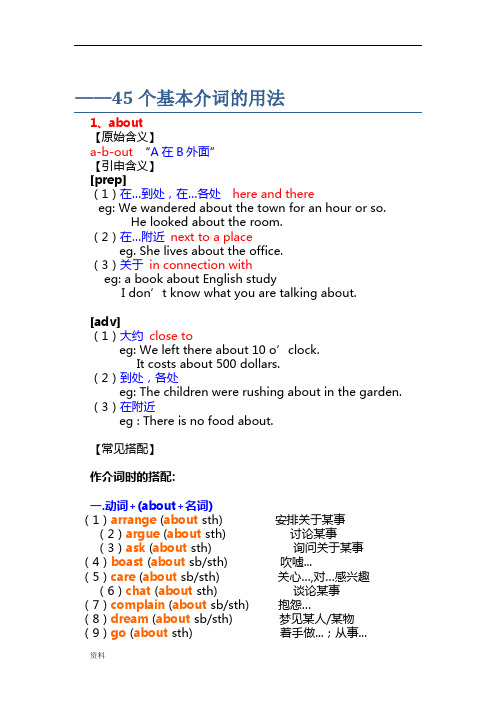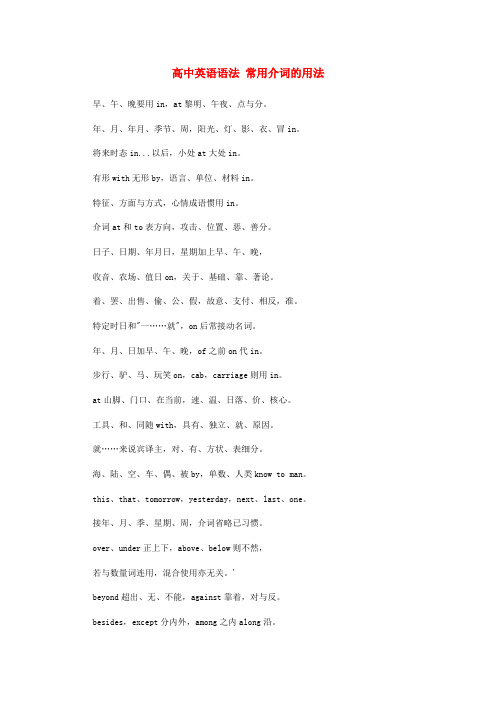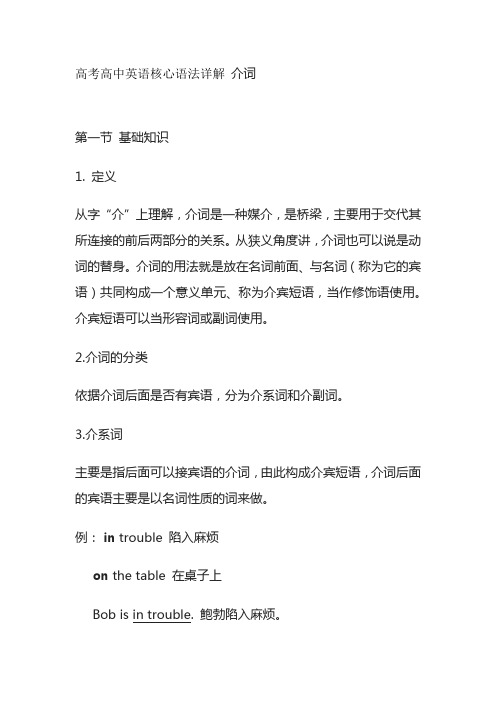高中英语高考介词用法总结(基本用法+具体用法)
最新高中英语45个介词的基本用法

——45个基本介词的用法1、about【原始含义】a-b-out “A在B外面”【引申含义】[prep](1)在…到处,在…各处here and thereeg: We wandered about the town for an hour or so.He looked about the room.(2)在…附近next to a placeeg. She lives about the office.(3)关于in connection witheg: a book about English studyI don’t know what you are talking about. [adv](1)大约close toeg: We left there about 10 o’clock.It costs about 500 dollars.(2)到处,各处eg: The children were rushing about in the garden. (3)在附近eg : There is no food about.【常见搭配】作介词时的搭配:一.动词+(about+名词)(1)arrange (about sth) 安排关于某事(2)argue (about sth) 讨论某事(3)ask (about sth) 询问关于某事(4)boast (about sb/sth) 吹嘘...(5)care (about sb/sth)关心…,对…感兴趣(6)chat(about sth) 谈论某事(7)complain(about sb/sth) 抱怨…(8)dream (about sb/sth) 梦见某人/某物(9)go (about sth) 着手做...;从事...(10)hear (about sth) 听说...(11)know(about sth) 了解...(12)learn (about sth) 得知某事(13)put (about sth)散布(谣言等)(14)quarrel (about sth) 为...争吵(15)see (about sth) 负责处理...(16)talk(about sth) 谈论...(17)think (about sth) 考虑..(18)warn sb (about sth) 告诫某人关于某事(19)wonder(about sb/sth) 对.. 好奇(20)worry(about sb/sth) 对...担心二、名词+(about+名词)(1)concern (about sb/sth) 对…的关心/关怀(2)curiosity (about sb/sth) 对…的好奇(3)doubt (about sb/sth) 对…的怀疑(4)ethusiasm (about sth) 对…的热情(5)information (about sb/sth) 关于…的信息(6)remark (about sth) 对…的评论(7)opinion (about sth) 对…的意见(8)view (about sb/sth) 对...的观点三、be+adj+(about+名词)(1)be angry (about sth) 为…而生气(2)be anxious(about sth) 为…忧虑(3)be careful(about sth) 当心…(4)be cautious (about sth) 谨防...;对...持谨慎态度(5)be certain (about sth) 确信关于某事(6)be curious (about sth) 对…感到好奇(7)be disappointed (about sth) 对…感到失望(8)be excited (about sth) 对…感到兴奋(9)be glad/happy (about sth) 对…感到高兴(10)be hopeful (about sth) 对…抱有希望(11)be crazy/mad/wild (about sth)对…痴狂;酷爱某事(12)be nervous (about sth)为…感到不安/因...感到紧张(13)be optimistic/positive (about sth)对...是积极乐观的(14)be particular (about sb/sth) 对... 讲究,挑剔(15)be sad (about sth) 为…而难过(16)be serious (about sth) 对…认真(17)be sorry (about sth) 对...抱歉作副词时的搭配:名词+动词+about(1)sth come about某事发生(2)sth get about某事(尤指消息等)传开(3)sb turn about某人转身(4)sb wander about某人徘徊,游荡(5)sb walk about 某人走来走去2、above【原始含义】a-b-over“A在B上方”【引申含义】prep.(1)在…上方at or to a higher place than sth/sbeg: The sun rose above the horizon.(2)数目大于…/重量超过…/价格(能力、地位)高于…more than sth.; greater in number, level or age than sb./sth.eg: There is nothing in the store above 50 cents. (3)重要性或质量超过、胜过of greater importance or of higher quality than sb/sth eg. I rate her above most other players of her age. (4)声音超过…louder or clearer than another sound eg: I couldn’t hear her above the noise of the traffic. (5)不至于,不屑于做某事too good or too honest to do stheg. She is above suspicion.【常见搭配】一、动词+(above+名词)(1)live ( above one’s income) 入不敷出地生活(2)put A(above B) 把A看得比B更重要(3)rise (above sth) 克服...,不受....的影响(4)talk (above one’s head) 高深莫测地谈论二、be+(above+名词)(1)be (above oneself )兴高采烈= be in one’s high spirit(2)be (above one’s head)难以理解/超出某人理解能力3、across【原始含义】a-grass“一片草坪”,across指在平面上经过,就像人走过一片草坪那样。
高中英语语法 常用介词的用法

高中英语语法常用介词的用法早、午、晚要用in,at黎明、午夜、点与分。
年、月、年月、季节、周,阳光、灯、影、衣、冒in。
将来时态in...以后,小处at大处in。
有形with无形by,语言、单位、材料in。
特征、方面与方式,心情成语惯用in。
介词at和to表方向,攻击、位置、恶、善分。
日子、日期、年月日,星期加上早、午、晚,收音、农场、值日on,关于、基础、靠、著论。
着、罢、出售、偷、公、假,故意、支付、相反,准。
特定时日和"一……就",on后常接动名词。
年、月、日加早、午、晚,of之前on代in。
步行、驴、马、玩笑on,cab,carriage则用in。
at山脚、门口、在当前,速、温、日落、价、核心。
工具、和、同随with,具有、独立、就、原因。
就……来说宾译主,对、有、方状、表细分。
海、陆、空、车、偶、被by,单数、人类know to man。
this、that、tomorrow,yesterday,next、last、one。
接年、月、季、星期、周,介词省略已习惯。
over、under正上下,above、below则不然,若与数量词连用,混合使用亦无关。
'beyond超出、无、不能,against靠着,对与反。
besides,except分内外,among之内along沿。
同类比较except,加for异类记心间。
原状because of,、 owing to、 due to表语形容词under后接修、建中,of、from物、化分。
before、after表一点, ago、later表一段。
before能接完成时,ago过去极有限。
since以来during间,since时态多变换。
与之相比beside,除了last but one。
复不定for、找、价、原,对、给、段、去、为、作、赞。
快到、对、向towards,工、学、军、城、北、上、南。
but for否定用虚拟,复合介词待后言。
英语高中语法介词的用法和常用介词的区别

英语高中语法介词的用法和常用介词的区别高中英语语法:介词的5种用法1. 时间1)at表示在某一时间点: at 3 o’clock2)in表示在某一时间段内的某一或某些点: in 2004in表示在某段时间的结束点:I’ll see you again in a week.3) during表示某一时间段内自始至终:during the first period4) on表示在某一day/date或其中的某一段:on Monday, on Sunday morning5) by表示不迟于某个时间:by now2. 地点1)at表示在某处(而非它处):at school2) in表示在内部或某个范围内:in the office3) on表示在上面与某平面接触:on the table4) outside表示在某个范围之外:outside world5) under表示在比某个位置低的地方或在某表面之下:under a chair6) by表示靠近或接近:by the window3. 原因1)because of表示因为或以…为理由:because of my father2) for表示动作或活动的目的、目标或意图:for sale3) out of表示起源、来源或原因:out of duty4. 方式1)with表示以…方式:with skill2)in表示以某种方式: in French, in cash, in this way5. 方法1) by表示方法、手段: by the back road, by bus, by working hard2) on表示运送方式:on a train, on foot3) in表示途径或材料:in oils高中英语语法中常用介词的区别1、 at、in、on:如:常用词组有: at noon, at night表示时间的 at, in, on:at 表示片刻的时间,at 8 o’clock,at midnight, at the end of, at that time, at the beginning of, at the age of, at Christmas, at New Year 等。
介词of高中用法归纳

介词of高中用法归纳好嘞,以下是为您创作的关于“介词 of 高中用法归纳”的内容:咱上高中了,英语里这个介词“of”那可真是无处不在啊!今天咱们就来好好唠唠它的用法。
先说说“of”表示“所属关系”的时候。
比如说“the legs of the table”(桌子的腿),这“of”就明确表明了“腿”是属于“桌子”的。
就像我之前有一次在教室里,看到一张有点摇晃的桌子,我仔细一瞧,原来是其中一条腿有点问题,这时候我心里想的就是“the problem of the leg of the table”(桌子腿的问题)。
“of”还能用来表示“关于;涉及”。
比如“a book of history”(一本历史书),这就清楚地告诉咱这书是和历史相关的。
我记得有一回,我去图书馆找书,目标很明确,就是要找一本“of”后面跟着我感兴趣主题的书,找了老半天,终于在一个角落里发现了那本“a novel of adventure”(一本冒险小说),别提多开心了。
当“of”表示“同位关系”时,像“the city of Beijing”(北京市),“Beijing”和“city”就是同位的关系。
有次我和朋友聊天,说到想去旅游,朋友就说特别想去“the city of Shanghai”,还跟我描述了好多对上海的向往。
“of”在表示“数量、种类”时也很常见。
“a group of students”(一群学生),“a kind of flower”(一种花)。
有次学校组织活动,来了“a groupof visitors”(一群参观者),我们作为志愿者负责接待,那场面可热闹了。
还有“of”用于“表示材料”,像“a cup of glass”(一个玻璃杯)。
我家里就有那么一个特别漂亮的“a cup of glass”,每次用它喝水都感觉心情超好。
“of”表示“原因”的情况也不少,“die of illness”(死于疾病)。
我曾经在医院看到过一个悲伤的场景,一位病人最终“died of a serious illness”,那一幕让我更加珍惜健康。
(完整版)高考英语常用介词短语和固定搭配

高考英语常用介词短语和固定搭配一.相近介词和介词短语1. With the help of 在 ------- 帮助下un der the leadership / care of 在-- 领导/关心下2. be strict with sb. 对~人要求严格be strict in sth. 对~事要求严格3. at present=at the present time 目前for the present 暂时4. in the sun/sunshine 在阳光下under the sun 在世界上5. lie in 位于~~之内lie on 同~~接壤lie to 位于~~之外6. at least 至少in the least 丝毫,一点7. by name 名叫in the name of 以~~名义8. in the air 空中,在流传on the air 播出9. in the way 挡路,障碍,用~~方法in a way 在某点上,在某种程度上get one 's own way to do 随心所欲give way 让步,屈服lose one 's way 迷路by the way 顺便说一下on one's way to 在去~~的路上Come this way 这边走10. at the corner 在拐角处(外角)in the corner 在角落里(内角)on the corner 在角落上(外角上)11. judge by / from judge for oneself 12. at the end (of) at the beginning of根据~~来判断由某人自己来判断在~~结束时在~~开始时at the back of 在~~背后,支持at the age of ~~岁时at the foot of 在~~脚下at the bottom of 在~~底部at the top of 在~~顶上at/on the edge of 在~~边上13. in the course of 在-------- 过程中in the eyes of 从------- 观点看来,在--- 眼里in the face of 面对--- ,尽管,纵使in the middle of 在------ 中间in the end =at last=finally 最后14. on the eve of 在------- 前夕on the side of 在-------- ^边15. after a time = after some time 过一段时间后for a time = for some time 一时,有一段时间16. behind time 迟到,过期behind the times 落在时代后面17. at no time 决不in no time 立即,马上18. at one time = once time 曾经at a time = each time 每次at times = sometimes 有时at all times经常,一直,始终at the same time 同时at the time 在-- 的时候by the time 到-- 的时候19. for a moment 一会儿for the moment 暂时at the moment 当时the mome nt /mi nute /in sta nee 正当----- 杀U 那20. once or twice 一两次more than once 不止一次once more 重新,又once upon a time 从前once in a while 偶尔二.归类记忆1. be on show / display / play / sale / strike / duty / trial2. be of value / importance / use / no use / color / age / size / height / weight / significance3. to one's joy / surprise / pleasure / astonishment / sorrow / delight4. in surprise / wonder / alarm / terror / horror / delight5. by air / bicycle / boat / bus / car / letter / post / plane / telephone / train / wire6. at daybreak / sunrise / dawn / noon/ dark / night7. out of breath / control / question / sight8. in fact / reality / substance / nature / practice / theory / short/ brief / a word / detail / all / average / full / time / fashion / existence / turn / vain / haste / appearance / common / sum/ general / particular / public / secret / order / part / power / stock / case / bed / future / name / addition / sight9. on duty / shift / holiday / leave / business / purpose / time / sale / show / board / hand / record / request / root / earth / farm / principle10. for example / instance / all / good / nothing / convenience / short / fear / sale11. by weight ( volume size number~~ ) / profession / definition / rule / turn / chance/ accident/mistake / hand / train ( bus ,taxi ,ship ,boat ~~) / air / land / force / day / nature /12. at most / least / best / worst / once / first / last / home/ school / will ( at will:任意) / work /night / midnight / daybreak / dawn / present / length / large13. as above / below / following / over / usual / before / a matterof fact14. above all / measure / normal15. before all / long / time / now / then16. after all / class / school17. out of action / order / condition / use / operation / step / joint/ repair/ gear / balance / range/doubt / date / danger / hand / shape / place / question / stock /18. with caution / interest / difficulty / ease / advantage / effect/ reason / vigor / reserve / success / confidence19. beyond comprehension / conception / description / expression / doubt / control / reach / power / measure / grasp / compare / controversy / dispute / hope / example20. under age / discussion / test / way / repair 三.组合记忆(1)由两个词组成的复合介词.1. 以of 结尾ahead of , aside of , because of , east of , west of , instead of ,short of , lack of , regardless of2. 以to 结尾according to , as to , counter to , due to , owing to , next to , previous to , prior to , apostle to ,relative to , subject to , subsequent to , on to , thanks to3. 以with 结尾along with , together with4. 以for 结尾as for , but for , except for , save for5. 以from 结尾from above , from below , from among , from between , from beneath , from behind , from over(2)由三个词组成的复合介词.1. 以in 开头in addition to , in advance of , in agreement with , in case of , in charge of , in comparison within consequence of , in consideration of , in (the) course of , in contrast with , in the face of ,in favor of , in front of , in honor of , in (the) light of , in the middle of , in the namein need of , in obedience to , in opposition to , in place of , in preference to , in (the) process ofin regard to , in reply to , in respect of2. 以by 开头by means of , by order of , by reason of , by virtue of , by way of3. 以at 开头at the beginning of , at the cost of , at the end of , at the handsof , at mercy of , at the point of ,at the risk of4. 以with 开头with an eye to , with the exception of , with the purpose of , with reference to , with regard to,with respect to , with a view to , with the view of5. 以for 开头for the benefit of , for fear of , for lack of , for the good of , for the sake of6. 以under 开头under cover of , under pain of , under the present of7. 以on 开头on account of , on behalf of , on the occasion of , on the part of , on the point of , on top of。
高考高中英语核心语法详解 介词

高考高中英语核心语法详解介词第一节基础知识1. 定义从字“介”上理解,介词是一种媒介,是桥梁,主要用于交代其所连接的前后两部分的关系。
从狭义角度讲,介词也可以说是动词的替身。
介词的用法就是放在名词前面、与名词(称为它的宾语)共同构成一个意义单元、称为介宾短语,当作修饰语使用。
介宾短语可以当形容词或副词使用。
2.介词的分类依据介词后面是否有宾语,分为介系词和介副词。
3.介系词主要是指后面可以接宾语的介词,由此构成介宾短语,介词后面的宾语主要是以名词性质的词来做。
例:in trouble 陷入麻烦on the table 在桌子上Bob is in trouble. 鲍勃陷入麻烦。
A red apple is on the table. 一个红苹果放在桌子上了。
4.介副词后面没有宾语,而是直接当副词使用。
Come in. 进来!The soldier stood up. 那名士兵站起来了。
5. 介副词和介词共同使用Mary went down to the basement. 玛丽去了地下室。
down 是介副词,后面没有宾语、直接修饰动词went;to 是介系词,后接名词词组the basement 当宾语、构成一个介词词组to the basement;went 看作不及物动词,后接介词to,再加宾语the basement;He has gone over to your office.over 是介副词,直接修饰动词has gone;to 是介词,后接名词词组your office 当宾语,构成一个介词词组to your office;gone看作不及物动词,后接介词to,再加宾语your office;第二节介系词在短语层面的应用介系词加宾语构成介宾短语后,主要出现在后修饰位置,其作用是交代中心词与其后的宾语之间的关系。
此时介宾短语也可视为形容词的性质。
例:a.2000 entry into the World Trade Organization2000年加入世贸b.an important earner of foreign exchange 赚取外汇的重要来源c. a boom in exports 出口增长第三节介系词在句子层面的应用1. 前状/后状:With the warm weather, the trees grow very well. 天气暖和,树木生长的很好!Kill two birds with one stone. 一石二鸟/一举两得。
高中英语介词短语的用法
高中英语介词短语的用法高中英语介词短语的用法【文章导读】介词短语,是介词和其它代词或名词或词组搭配形成的短语。
口语上简称“介短”。
该短语主要是用来表示词与词,词与句之间的关系。
下面是关于高中英语介词短语的用法,欢迎阅读参考!1介词的搭配与选择介词不能在句子中独立充当一个成分,而需要与其后面的宾语相结合,成为介词短语,在句中充当一个成分。
所以选用什么介词要根据其后面所接的宾语而定。
但是,有时介词也受其前面用词的限制,因此,许多情况下也应根据介词前面的词选用相应的介词。
2介词的语法功能介词与其他词类或成分结合后方能在句子中充当语法成分,构成介词短语。
介词短语可以作定语(须后置)、状语、表语、宾语补足语等。
例如:The skyscraper in the distance is a five-star hotel. (定语)They play football in spite of the rain. (状语)The decision is of great importance to me. (表语)They found the machine in a bad state. (宾语补足语)3介词的分类英语常用的介词大致可分为四类:1) 简单介词顾名思义,简单介词是指由一个单词构成的介词,也是使用最频繁的.一类介词,常用的有:at,about,above,across,after,among,against,before,behind,below,beside,between,beyond,but,despite,during,except,for,in,of,on,over,near,past,round,since,through,till,until,with,up等。
2) 合成介词指由介词+其他介词或副词构成的介词,常用的合成介词有:inside,into,onto,outside,throughout,within,without等。
高中常见介词的基本用法
高中常见介词的基本用法-CAL-FENGHAI-(2020YEAR-YICAI)_JINGBIAN介词介词不能单独作句子成分,而是用来表示名词或代词等和句中其他词的关系,通常放在名词或代词之前,构成介词短语。
介词短语作为一个成分在句中可用作定语,表语,状语等。
When shall we have the talk on the history of the Party?我们何时听党史报告(定语)His elder brother is in the army.他的哥哥在部队。
(表语)I went to school at half past seven yesterday.昨天我7:30 上学。
(状语)Will you please come along with me?跟我一起走好吗(状语)※同一个汉语词可以译成不同的英语介词。
例如:一幢石头的房子 a house of stone这个房间的钥匙 the key to this room明天的票 the ticket for tomorrow(一)About1.表示地点:在。
周围;在。
附近We took the foreign guests about the campus.我们带领外宾在校园里各处看看。
2.表示时间:大约。
;近于。
时刻前后We left there about six o’clock我大约在六点左右离开那个地方。
3.表示客体关系:对于;关于;有关。
例如:1) I must see him, I’ve heard so much about him我必须要见他,我听到很多关于他的事情。
2) What do you know about China?关于中国你知道些啥?(二)Above表示位置,职位,数量,年龄等:在。
上方;在。
之上;超过。
1) Henry’s work is well above the average.亨利的功课大大超过一般水平。
【高中英语】高中英语:介词的主要用法讲解
【高中英语】高中英语:介词的主要用法讲解1、介词的主要用法:介词是虚词,不能单独使用。
在介词之后,通常有一个名词或代词(宾语)或其他词类、短语或分句相当于一个名词作为宾语,构成一个介词短语。
有些介词是由两个以上单词组成的短语介词,如outof、becauseof、awayfrom、ontopof、everfash、nextto、accounto、infontof等。
2、介词的分类表:(见下表)位置(位置、范围)介词:在前面、前后、对面、后面、对角、靠近、沿着中间、围绕在四周、在四周、在前、在后、在后、在旁边、在中间、在下、下、下、从内、内、内、近、其中,上、外、外、上、下、上、上、上、下、前、近、中、中、候的结束。
方向(目标趋向)介词:across横越...,against对抗...,along沿着...,around绕着...,round环绕...,at朝着...,behind向…后面,etween…and…从…到...,by路过/通过...,down向…下,for向...,from从/离...,in进入...,into进入...,inside到...里面,near接近...,off脱离/除...,on向...上,outof向...外,outside向....外,over跨过...,past经过/超过...,through穿过...,to向/朝...,towards朝着...,onto到...上面,onto到...上面,up向...上,awayfrom远离...时间介词:About,After,at,before,by,until,interval,for,from,in;之后(多久),在(某一天),过去。
(小时),因为。
(到目前为止),通过。
(句号),直到。
,直到直到(到下一刻),从那时起,在开始的时候,Atdidof在结尾,在中间,在时间的中间。
方式介词:as作为/当作...,by用/由/乘坐/被...,in用…(语言),like与…一样,on骑(车)/徒(步),通过(收音机/电视机),over通过(收音机),through通过...,with用(材料),用(手/脚/耳/眼),without没有…涉及介词:关于,除了For/关于。
高中英语:介词by的用法知识点
高中英语:介词by的用法知识点介词by可以用来表示方位、时间、手段等,其用法在高考中曾多次出现。
下面结合高考试卷和其它一些例句做一下归纳:一、by+地点名词。
表方位,意为:“在…旁边”。
如:by the lake/river/tree/window/door 等。
She searched the top of the hill and stopped to rest on a big rock by the side of the path.(NMET90)她搜索了山顶,然后停下来在路边的一块大石头上休息。
After supper she would sit down by the fire,sometimes for as long as an hour,thinking of her young and happy days.(2003上海·春)晚饭后,她常坐在火旁,有时长达一个小时地回忆她那青春、快乐的年代。
注:有时可表:“从…旁经过”,多与动词go/walk/pass等连用。
As we boys were rushing towards the playground,Jim slipped by the table.(NMET92完形)当我们这些男生冲向操场时,吉姆从桌旁溜过。
二、by+时间名词。
意为:“到…时(已发生某事),此时谓语多用完成时;最晚、不迟于…,在…之前”。
如:by now/then/this time/next Friday/the end of/three o`clock等。
By the end of last year,another new gymnasium had been completed.(2003上海·春)到去年年底,又有一座新体育馆峻工了。
The train leaves at 6:00 pm.So I have to be at the station by 5:40 pm at the latest.(NMET97)火车下午六点开,所以最晚我得五点四十赶到车站。
- 1、下载文档前请自行甄别文档内容的完整性,平台不提供额外的编辑、内容补充、找答案等附加服务。
- 2、"仅部分预览"的文档,不可在线预览部分如存在完整性等问题,可反馈申请退款(可完整预览的文档不适用该条件!)。
- 3、如文档侵犯您的权益,请联系客服反馈,我们会尽快为您处理(人工客服工作时间:9:00-18:30)。
高考英语介词用法总结一、基本用法①介词短语用作形容词时通常置于名词后。
She loves the ring in the shop.她喜欢商场里的那枚戒指。
The lady from the U.S.loves spicy food.从美国来的那位女士很喜欢吃辣。
②介词短语用作副词时,可以灵活地放在句子前后。
We are going to the market.我们在去市场的路上。
---to the market是动词go的副词。
In that case you should go see a doctor.如果那样的话,你去医院看看吧。
---in the case用作修饰句子后半部分内容的副词。
③介词加名词由于介词后一定要接名词,所以如果要用动词的话,应将动词转换为动名词。
She’s not interested in the news.她对这则新闻没兴趣。
I'm so sorry for keeping you waiting.让你久等了,真是对不起。
④介词加宾语介词后加代名词时,应将主格转换为宾格。
I’m fond of him.我很喜欢他。
He's not into her.他不喜欢她。
1)Please, take care of him.请好好照顾他。
2)I'm sorry for being late.很抱歉,我迟到了。
3)Jack is used to working late, but Linda isn’t.杰克习惯工作到很晚,但琳达还不适应。
4)Because of them, the team lost the game.因为他们,所以输了这场比赛。
5)My father depends on me so much.我爸爸太依赖我了。
二、具体用法1.介词in①在...空间里或者是场所in a room 在房间里in the bank 在银行in the hot tub 在热水的浴缸里in the ocean 在海洋里in the sky 在天上in the air 在空中②在城市、国家等相对来说范围较大的场所in the Korean peninsula 在朝鲜半岛in the universe 在宇宙之中in the country 在乡村in the city 在城市里in Seoul 在首尔in Europe 在欧洲③年、月、季节等相对较长的时间in 2002 in the 1980sin March in springin winter in the 20th century④指早上、下午、晚上in the morning 在早上in the afternoon 在下午in the evening 在晚上对比: at noon 中午 at night 晚上⑤表示期间How could you finish he work in 3 days?这件事怎么可能在三天内完成?We can’t get to the island in 5 hours?我们不可能在五个小时之内到那个岛的。
⑥指穿着衣物时Who is the woman in the red dress?那个穿着红裙子的女人是谁呀?The boy in the baggy pants acts like he’s a rapper.那个穿着宽松牛仔裤的男孩举止像个饶舌歌手。
2.介词on①指物体在...上on the table 在桌上 on the floor 在地上on the surface在表面 on the wall 在墙上on the door 在门上 on the board 在黑板上②在日期和星期之前on Wednesday on Sundayson Labor Day on March 12 on Sunday afternoon③表示:与...相关,关于...的The study on mutation should be terminated immediately. 应当立刻中断对突变的研究。
I'm reading a book on preposition.我正在看一本关于介词的书。
④表示乘坐、骑、坐I’m on the bus.我正坐公交车过去呢。
Are you on the subway? 你在地铁上吗?1)The man in the suit comes to my shop every morning. 那个穿西装的男士每早都会到我的店里来。
2)I finished the report on Japanese movies.关于日本电影的报告我已经完成了。
3)I will meet him on Friday.我会在周五见他。
4)Didn’t you read the sign on the door?没有看到门上的标志吗?5)In 2007, she became a professor.她在2007年当上了教授。
3.介词at①用在相对较窄的场所at home at the airportat the hospital at the doorat the train station at the information desk②表示特定的事件或活动at the party at the meetingat the music concert③表示特定的时刻或时间at 3 o’clock at 5:30 P.M. at noonat night at lunchtime at that time4.介词for①常被用于“为了...”I did everything for my family.我做的一切都是为了我的家。
I bought it for you.我为你买了这个东西。
②表示时间(一定期间)She has been training the dog for 5 months.她的狗已经五个月了。
For 2 weeks, the monk didn’t eat anything.这位高僧两周滴水未进。
③表示原因Thank you for coming to the party.感谢你来参加派对。
Sorry for leaving too early.不好意思,我要先离开。
④表示方向The plane for San Francisco is now boarding.飞往旧金山的航班正在登机。
She's leaving for the U.S.with her parents.她要和父母一起去美国。
⑤表示赞成Are you for or against?你是赞成还是反对?I'm not against your proposal.I’m totally for it.我不反对你的提案,我绝对赞成。
1)She bought a bag for you.她给你买了这个包。
2)You can wear the pajamas at home.你在家穿睡衣也没关系。
3)The train for New York was canceled.去往纽约的火车取消了。
4)I met him at the party.我在聚会上遇到他了。
5)I haven’t slept for two days.我两天都没睡觉。
5.词by①表示时间,意思是“在...之前;不迟于...”You should be home by 11 p.m.你要在晚上十一点之前到家。
You should complete the report by March 20th.请将报告于3月20日之前完成。
②表示被动,意思是“被,由”The book was written by Walt Whitman.这本书的作者是沃尔特⋅惠特曼。
The country should be run by its people.国家是由人民当家作主的。
③表示:位置,“在...旁边”She parked the car by the mailbox.她把车停在邮筒旁边。
Stand by me.请站在我身边。
④表示交通方式,意为“乘坐”,或者通过某种方式We'll go there by bus.我们坐公交车过去。
I'll pay by credit card.我用信用卡支付。
6.介词of①表示所属或是物品的一部分the title of the book 书的题目the contract of the house 房子的合同②表示关于The movie is a story of an American reporter in England.电影讲述的是美国记者在英国的故事。
I'm reading a book of short novels.我在读一本跟短篇小说有关的书。
③表示出处或出身The book is made of 100% recycled paper.这本书是由百分百的再生纸张制成的。
The people of England are kind.英国人都很善良。
④表示前面出现的名词或同一事物The idea of making a new chair from the old one is brilliant. 把旧椅子做成一个新椅子的想法很好。
I don’t like the idea of laying off the workers.我不大认同解雇工人。
7.介词to①表示对象I’ll give it to her.我把这个给她。
She wrote about 100 letters to me.她给我写了一百多封信。
②表示方向We go to church on Sundays.我们每周日都去教堂。
Move to your right.请到你的右边去。
③表示结果My dog tore my paper to pieces.我的狗把我的论文撕成了碎片。
The movie put me to sleep.这部电影让我睡着了。
8.介词with①表示“和...一起“I’ll go with her.我和她一起去。
Who broke into the bank with you?谁和你一起抢得银行?②表示所属关系I’m looking afte r an old guy with a fortune.我在照顾一位很富有的老人。
Let's rent a house with huge windows.我想租一个有大窗户的房子。
③表示工具、用具I have no pen to write with.我没有笔来写东西。
